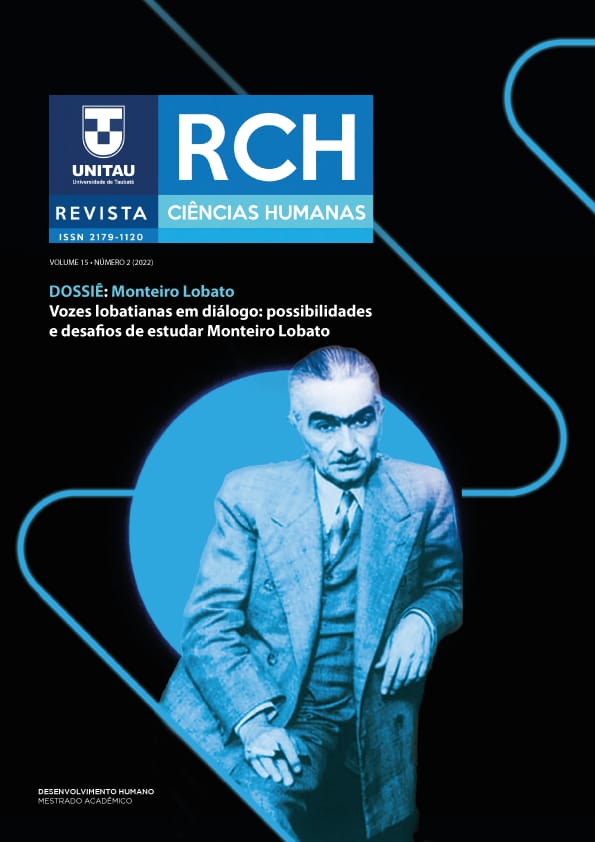BETWEEN LITERATURE AND POLITICS
dialogue of masters in letters from Monteiro Lobato to Cesídio Ambrogi
DOI:
https://doi.org/10.32813/2179-1120.2022.v15.n2.a892Keywords:
Literature, Politics, autobiography, Taubaté-SP, local societyAbstract
In this article, the objective was to analyze Monteiro Lobato's ideas and positions based on the reflections he shared with his friend Cesídio Ambrogi in letters he addressed to him. Thematically, the letters cover a wide range of subjects, however, the focus is centered on the discussions and political positions and the relations of the contextual impressions expressed in the literature produced by both, which constituted the beginning of the friendship and was consolidated as one of the points of confluence of interests. Therefore, it is considered that the letters, recognized as involuntary testimonies, make it possible to perceive more clearly the positions and thoughts of the interlocutors. This is because they are private documents that were not originally produced with the intention of being publicized; therefore, allow greater freedom of expression. The documentary corpus of this study covers the letters sent by Monteiro Lobato to his friend Cesídio Ambrogi, which are part of a private collection; and newspaper articles from the Hemeroteca Antonio Mello Júnior de Taubaté and the Hemeroteca Digital of the National Library. The Brazilian political context of the 1940s is dealt with in the letters and mobilizes the attention of the interlocutors who are, in this period, involved with national and local political issues, because at this moment Lobato turns to the city of Taubaté due to personal issues and, as the analysis showed, it reflects on latent issues of its relationship with the city.
Metrics
References
Andrade, Antônio Carlos de Argôllo. (2022). Recordando Monteiro Lobato. Taubaté-SP: edição do autor.
Atas do Conselho da Intendência Atas da Câmara Taubaté. Ortiz, José Bernardo (org.) (2002). Taubaté-SP: prefeitura Municipal de Taubaté.
Azevedo, Carmen Lucia de; Camargos, Marcia e Sacchetta, Vladimir. (1997). Monteiro Lobato: Furacão na Botocúndia. São Paulo, Editora Senac.
Barbosa, Rui. (1956), Obras Completas, XLVI, MEC.
Bloch, Marc. (2001) Apologia da História, ou o ofício do historiador. Rio de Janeiro: Jorge Zahar Editor.
Cartas de Lobato e Cesídio. Almanaque Urupês. Disponível em: https://almanaqueurupes.com.br/index.php/correspondencias-de-lobato-e-cesidio/ Acessado em: 23/04/022.
Cavalheiro, Edgard. (1959) Prefácio in: Lobato, M. Cartas escolhidas. São Paulo: Brasiliense.
Éramos seis, e Lobato, Rangel e Cesídio. Almanaque Urupês. Disponível em: https://almanaqueurupes.com.br/index.php/eramos-seis-lobato-e-cesidio/ Acessado em: 23/04/2022.
Malatian, Teresa. (2012) Cartas: narrador, registro e arquivo. In: Pinsky, Carla B. e Luca, Tânia Regina de (orgs.) O historiador e suas fontes. São Paulo: Contexto.
Mello Junior. Antonio. (1983) Imprensa taubateana: contribuição à sua história (1861-1981). Taubaté-SP: Egetal.
Passarelli, Umberto (1996). Contribuição à História: denominação de ruas e logradouros públicos de Taubaté. Taubaté-SP, JAC Gráfica e Editora.
Passiani, Enio. Na Trilha do Jeca: Monteiro Lobato e a formação do campo literário no Brasil. Bauru: EDUSC/ANPOCS, 2003.
Souza, Jeronymo. (1963) Mestre Cesídio. Taubaté-SP: Edições Taubaté.
Sevcenko, Nicolau. (1999) Literatura como Missão: Tensões Sociais e Criação Cultural na Primeira República. São Paulo: Brasiliense.
Tin, Emerson (2014). A barca de Gleyre: uma raríssima “curiosidade”. Lajolo, Marisa (org.) Monteiro Lobato, livro a livro. São Paulo: Editora Unesp.
Obras de Monteiro Lobato:
Lobato, Monteiro. (1972) A Barca de Gleyre. São Paulo: Brasiliense.
______, (1972) Cartas Escolhidas. São Paulo: Brasiliense.
______, (1964) Prefácios e Entrevistas. São Paulo: Brasiliense.
Downloads
Published
How to Cite
Issue
Section
License
Copyright (c) 2022 Human Sciences Journal - RCH

This work is licensed under a Creative Commons Attribution 4.0 International License.
The publications of the Human Sciences Journal are registered under the Creative Commons Attribution CC-BY license.
1. The contents of the manuscripts are the exclusive responsibility of their author.
2. It is allowed the total or partial reproduction of manuscripts published in the journal, provided that the source is cited.
3. When submitting their manuscript to the Journal, the authors certify that they are of their own authorship and unpublished (not published in any digital or printed media).
4. The copyright of the articles published in the Journal are of the author, with first publication rights reserved for this journal.
5. For disclosure purposes, the Journal may replicate the works published in this journal in other media, such as social networks (Facebook, Academia.Edu, etc.).
6. The Journal is of public access, therefore, the authors who submit manuscripts agree that they are of free use.
7. In case of any illegality, fraud, or other attitude that puts in doubt the honesty of the publication, especially the practice of plagiarism, the manuscript will be automatically rejected.
8. If the manuscript has already been published, it will be immediately removed from the base of the Journal, its citation linked to the Journal will be prohibited and the cancellation of the referred publication shall be reported in the next issue of the one in which the article was published. In case of the procedure for the withdrawal of the paper the authors will be informed beforehand, being guaranteed the right to a broad defense.
9. The personal data provided by the authors will be used exclusively for the services provided by this publication and will not be made available for other purposes or to third parties.





